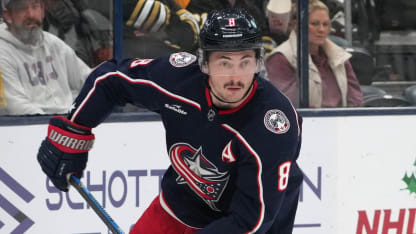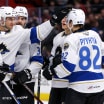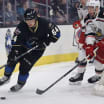SvoNotes is a weekly column by BlueJackets.com reporter Jeff Svoboda.
One of Zach Werenski’s greatest strengths is that he seems to run the same temperature all the time.
There’s room for all sorts of personalities on a team, but there’s something to be said for a player who’s a beacon of consistency, who doesn’t get too high or too low. In the 82-game grind of the NHL, there’s always a next thing to get to, a next game or shift to prepare for. As much as people can relate to emotions on a sleeve and rah-rah speeches in movies, there’s also a need for those who bring calm in a storm.
Yet for one night last week, for perhaps one of the first times we've seen in a media setting, you could describe Werenski as wound up. The Blue Jackets had just let a winnable game against Montreal slip away in the third period, and as Werenski chatted at his locker, his cool-as-a-cucumber personality went up a few notches.
“We’re in no position to let points like that slip, and I just think we had a lot more to give in here and we didn’t give it. It’s frustrating,” he said. “For the most part, it wasn’t acceptable to our standards.”
A few days later, Werenski admitted it was a bit unlike him to show so much emotion after a game, but he also didn’t have any regrets.
“Obviously we’re behind the 8-ball a little bit in terms of wins and points,” he said. “I just didn’t think we had it that night, and it was just frustrating. I thought it was a game we let slip, and it would have been nice to get those two points. I was obviously a bit frustrated. I usually don’t show that type of emotion, but I just got caught up in the moment I guess.”
That was no problem to head coach Pascal Vincent, who said he didn’t see Werenski’s postgame comments but was happy to hear about the buy-in from one of his alternate captains.
“That happens when there’s an investment,” Vincent said. “When you invest into something and you’re not successful and you feel like you could have been – you're not always going to be, but if you’re emotionally invested and it doesn’t work and you feel you could have done better as a team, you’re gonna get frustrated, and that’s what we want to see.
“Zach is a real smart guy. He’s not necessarily the most vocal, but when he speaks, it makes sense. He’s a big leader on our team. I didn’t know that he was like that, but I’m not surprised. He’s all-in right now, and that’s good to see.”
A fundamental truth of a locker room, though, is if you’re not producing, it’s hard to make an impact as a leader, and Werenski has continued to get the job done in that regard as well. The 26-year-old defenseman currently sits tied for 10th among NHL blueliners with 20 points, and his 19 helpers are tied for fifth in the league at his position.
Over the last 15 games, he has 14 assists and is plus-5 while playing an average of 24:15 per night, including 30:26 Sunday at Boston in just the sixth regular-season game of his career he’s topped the 30-minute mark.
Werenski acknowledged he felt he got off to a bit of a slow start as he shook off the rust from missing the last 69 games of last season with a shoulder injury, but in recent games he’s feeling more and more like the two-time All-Star defenseman that he is.
“It takes time,” he said. “You can play OK games and fit in, but that’s not what you want to do, right? You want to be a difference maker and get back to your old self, and that takes time. As much as I’d like to jump back in games and be perfect with it, I knew that wasn’t going to be the case. I wasn’t getting frustrated. I kept coming to work here and putting the work in.”
Vincent said he and the coaching staff expected that transition period considering the time Werenski missed, but now that he’s got his legs back under him, the head coach sees a player who’s competing and performing at a high level.
“I’m seeing a better version of Zach,” Vincent said. “I think his game is getting more complete. We know he can skate, we know he can play offense, we know he can join the rush, but we see better sticks, better positioning defensively. I think he’s an outstanding player, but wer’e seeing more of a complete game on the defensive side as well.”
Talking Power Play
In the last nine games, the Blue Jackets’ power play is 5 for 20, a mark of 25.0 percent that you’d be pretty darn OK with over the course of a season.
Now, I’m fully aware that’s a small sample size. In the previous 12 games before that, the Jackets were 1 for 36, and you could make a pretty good argument it was causing the team to lose games considering six of those 12 games were one-goal losses where a man-up tally would have made a pretty big impact.
That type of struggle is a continuation of a long-term trend in Columbus, where the Blue Jackets haven’t had a power play finish in the top half of the NHL since 2016-17. They’ve gone through coaches and personnel, but something that some teams can make look so easy has been consistently difficult in Columbus.
The frustration has been there for years, including for Vincent, who has studied the power play for years as a coach and helped run it the previous two seasons before becoming the head coach this year.
“It’s funny because it’s not that complicated,” he said. “It’s attacking the net, getting the puck back and doing it again. And a big piece of the power play is winning the first faceoff. If you don’t, then you’re wasting 22 seconds minimum on that play alone. It’s not a two-minute power play anymore, it’s 1:38. So you win that faceoff, and it’s simple things – puck movement, attacking the net, get it back.”
Which is what led to me to ask something I was curious about – how much of the power play can be planned out and schemed up, and how much is it up to players to just make the right plays?
As you might expect, it’s a combination of both. There are strategic components to elements like breaking through the defense to get the puck in the zone, plus the routes and positions coaches want players to take. But in the end, it comes down to chemistry and artistry, which is where the talents of the players take over.
And if they’re not on the same page, Vincent said, that’s where the biggest breakdowns come. As we saw a season ago, when the Jackets had a consistent power-play lineup that featured Patrik Laine and Johnny Gaudreau on the wings, Boone Jenner at the net and Adam Boqvist quarterbacking, the Jackets had success. When one or two of those pieces was injured, there were ups and downs.
But of late, the Blue Jackets seem to have found something, with the team’s shooters getting into good spots and converting for a couple goals, while a few other tallies have used the good old-fashioned dirty work of getting the puck to the net.
“Puck movement is better, positioning is better, execution is better, and then we have the skills to finish,” Vincent said.
Dads Get Their Day
The Blue Jackets staged their annual parents’ trip this past weekend, with the team’s fathers getting the chance to come to town for a game and a road trip.
It’s always fun to see the players get to share their lives with their parents, and it was no different this time around. I really enjoyed getting the chance to talk to Mathieu Olivier and his father, Simon, about their shared hockey journeys and what it meant for Mathieu to be able to show the NHL life to his dad, who has had a long career in the sport but never quite made it to the top level.
There are stories like that throughout the team. Hockey, of course, is a family sport, and a number of the Blue Jackets have fathers in the game whose footsteps they followed on the way to making it a career. Then there are CBJ players whose dads worked 9-to-5 jobs, then sacrificed their weekends – and probably good portions of their paychecks – so their sons could chase their passions in the junior ranks.
No matter how they got there, hockey dads are hockey dads, and this particular crew certainly deserved to enjoy a game from a suite at Nationwide Arena on Friday, then trip to Boston with their sons for a road contest as well.
“It’s just a great thing,” Vincent said. “We live a life that for nine months, we’re in our world. It’s such a moment to say thank you to your family. Like, ‘This is why I’m here. You’re a big part of it, and I want to share those moments with you.’ So it’s amazing.”
For their part, the dads certainly seemed to enjoy the time around the rink. There was plenty of time to chat with the other dads, making new friendships, and the team and the fathers also had the chance Saturday night to share a dinner together.
Simon Olivier continues to coach junior hockey in New Brunswick, but he took a night off from his coaching duties for the trip. Simply put, he wouldn’t miss it.
“It’s funny how the bloodline has a link on everything, right?” he said with a laugh on Friday night. “You look at the way a player is and you look at the dad, and whether it’s the physical shape or the laidback attitude or whatever, it really has a link with how the player plays. It’s really interesting.
“This is really special. I took tomorrow night off. We have a game tomorrow in the Martimes, but I am one of 700 dads in the world (who can experience this), so it’s just really important to be here for my son.”




















